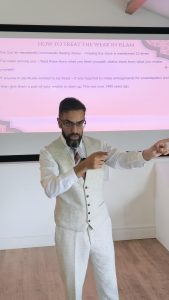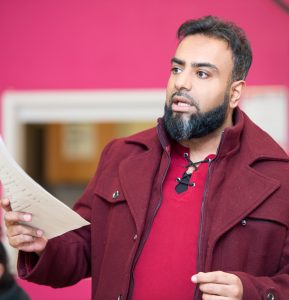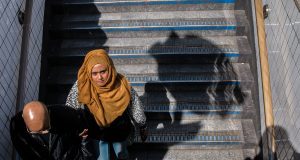More than one in three UK adults say they have witnessed anti-Muslim behaviour or comments in their workplace or place of study, and one in ten see it happening regularly. These are the findings of a new national survey commissioned by the Bradford-based charity Better Communities Bradford (BCB), which also found that one in five Brits believe Muslims are demonised more than any other religious group in the UK.
The survey, conducted in June 2025 by Research Without Barriers, offers fresh and troubling evidence of how embedded Islamophobia is in everyday life. From classrooms to boardrooms, discrimination is being witnessed and often normalised in the very spaces where people live, learn, and work.
In response to the findings, BCB has launched Project Unity, a one-year nationwide initiative aiming to counter anti-Muslim prejudice through education and meaningful dialogue. The programme is being delivered across workplaces, schools, universities, public institutions, and community venues, with a strong base in Yorkshire and the North of England.

“This is the inevitable result of the consistent, methodical racism exhibited by sections of the media and political class against Muslims,” said Abbas Najib, CEO of Better Communities Bradford. “It didn’t surprise me. Islamophobia in the UK isn’t a fringe problem it reflects deep structural prejudice, political and media manipulation, and the deliberate promotion of misinformation against Muslims. There’s nothing accidental about this.”
The workshops cover sensitive but essential topics, such as myths and misconceptions about Islam, Islam and extremism, media bias, and questions around gender, security, and justice. Each session is interactive, grounded in evidence, and tailored to the audience, whether in a school, corporate setting, or public sector organisation.
Although Muslims make up just 6.5% of the UK population, they are the victims in 42% of all religious hate crimes, according to the most recent Home Office data. BCB says that Project Unity is not just a reactive response to rising hate but a proactive call to organisations to lead with empathy, education, and inclusion.
For many Muslims, the survey results reflect long-standing lived experiences. Maleeha Haroon, 26, who works in school support staff in Halifax, said she once requested to use an empty classroom to pray but was refused despite the room not being in use.
“It made me feel like my faith didn’t belong there,” she said. “I felt like I had to choose between work and prayer. That disconnect was painful.”
Amal Yousuf, a 21-year-old Law student in Leeds, said her university does provide prayer rooms, but not in every building. “I often have to walk far to pray and end up late to class. I asked to adjust my timetable, but wasn’t allowed. It felt like my faith didn’t matter.”
Hashim Ali, 20, described the more subtle ways Muslims are singled out. “My mum wears a hijab and has been pulled aside at airports twice to show extra ID, while others weren’t questioned. It’s not aggressive, but it’s clear who’s being singled out.”
All three agreed that while awareness of Islamophobia has grown in recent years, action still lags behind. “People talk more about inclusion but often don’t act on it,” said Maleeha. “Having a prayer space isn’t enough; there needs to be flexibility too,” added Amal. Hashim said, “There’s awareness now, but actual change is still slow.”
Faith leaders also stress the importance of engagement both within and outside Muslim communities. Imam Naeem Torawala, who works on interfaith initiatives across West Yorkshire, said interfaith work is a core part of Islamic tradition.
“In Islam, we are taught to engage with others in a way that reflects mercy and wisdom,” he said. “The Qur’an says: ‘We have created you from male and female and made you peoples and tribes that you may know one another.’ Interfaith work allows us to fulfil this command to know one another, not just tolerate one another.”
On whether Muslim communities are engaging with these issues, the Imam said some are, but others remain hesitant. “The Prophet Muhammad (PBUH) did not avoid difficult conversations he engaged with Jews, Christians, and even those who opposed him, with dignity and clarity. We must ask ourselves: are we fulfilling our amanah (trust) as representatives of Islam in this society?”
He also highlighted the particular pressures facing young Muslims today, from identity confusion to lack of support. “They need spiritual guidance, yes, but also compassion. The Prophet Muhammad (PBUH) empowered young people, gave them responsibilities, and made them feel valued. We must do the same.”

“Project Unity is about building bridges with fact-based information,” Najib added.
“So much of the narrative around Muslims is shaped by anecdotes like someone claiming they walked down the street and no one spoke English. But the evidence tells another story: more Muslims go to university than the general population, more work in the NHS, more votes, and more run small businesses. We are fully integrated. The problem is a false narrative deliberately pushed by hate-mongering, divisive voices.”
“To organisations that hesitate to engage, I say this if you truly want to be a responsible institution, the bare minimum is to educate yourselves and your people. Hiding from the truth makes you complicit. Silence is not an option if you want to be a force for good.”
BCB hopes more institutions will take up the invitation to participate in Project Unity in the months ahead. The organisation says that hosting these workshops is not only a gesture of inclusion but also a way to strengthen internal culture, reduce reputational risk, and foster genuine cohesion.
Glossary
Islamophobia – Hostility, discrimination, or prejudice towards Muslims or Islam, often based on stereotypes or misinformation.
Project Unity – A UK-wide education programme by Better Communities Bradford that aims to reduce anti-Muslim hate through workshops, dialogue, and awareness campaigns.
Interfaith work – Collaboration and respectful dialogue between people of different religions to promote understanding and social harmony.
Amanah – A sense of trust or responsibility that Muslims believe they are accountable for — morally and socially.
Qur’an – The central religious text of Islam, believed by Muslims to be the literal word of God as revealed to Prophet Muhammad (PBUH).
Prophet Muhammad (PBUH) – The founder of Islam and a central figure whose life and teachings guide Muslim practice and values. “PBUH” stands for “Peace Be Upon Him,” a phrase Muslims use out of respect when mentioning the Prophet Muhammad.




